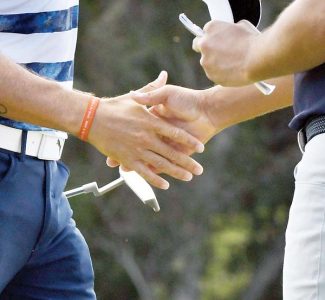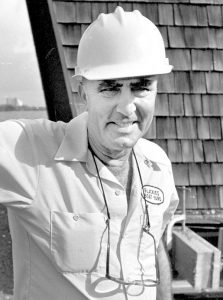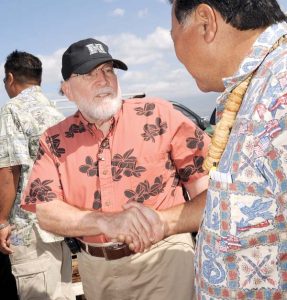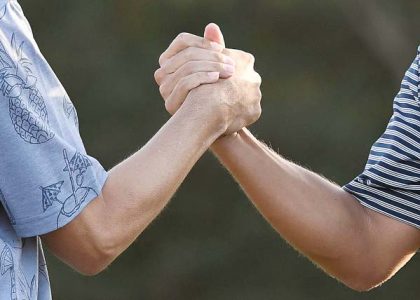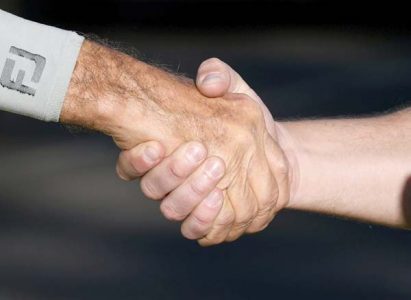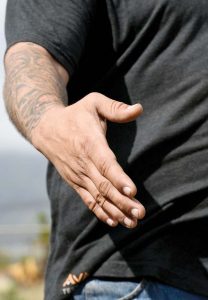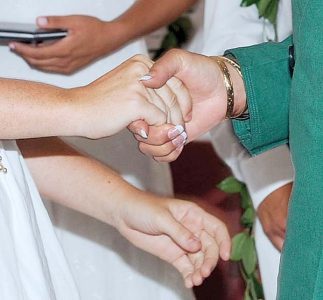Time to rethink shaking hands?
REPORTER'S CORNER: With coronavirus and flu, it’s good way to spread disease
Give ’em a firm grip and look ’em right in the eye. That’s how my father taught me to shake a hand.
It was a ritual he considered quite important. I remember him patiently practicing it with me until I got it right. He said it was more than just pressing the flesh, it was meeting someone on respectful terms, a commitment that what you said was true. A disinterested or lukewarm handshake was disrespectful.
Through many years and thousands of handshakes, I’d like to think my technique has been refined. For instance, a firm grip is not a squeezing competition or an excuse to hold tight until you are done telling a boring story. It is about consideration and shared humanity. Men and women shake hands in the traditional way more now, rightfully meeting on level terms. When my sons and daughter came of age, I made sure to pass my dad’s teachings on to them.
Lahaina bar owner, machine shop wizard and surly philosopher Blackie Gadarian was the first person I met who didn’t like shaking hands. Or maybe he was just the first to admit it. Even after I learned this, it took me a few times to quell the reflex to extend my right paw when I saw him. He could be quite gruff with folks, but he was always nice enough to me. That didn’t keep him from leaving me hanging.
Blackie said the ritual of shaking hands dated back to the bad old days of assassins and robbers. He said men who met on the trail would show their empty right hands and shake to prove they were not carrying a knife. He said in modern times there was no need to prove you weren’t going to stab a guy. I always wondered if germs are what tough salty Blackie really was averse to.
“He thought it was an unsanitary type thing and completely insincere,” his widow, Sara Gadarian, said this week. “When people would stick out their hands, he never felt comfortable with it.”
Sara says while Blackie tended bar he often wore a Velcro wrap that looked like a bandage on his hand so patrons wouldn’t attempt to shake. With a laugh she tells how a vacationing Mainland physician returned to enjoy the live jazz the bar was famous for and said, “My, that hand is still bad.”
Now that I’m about the age Blackie was when I met him, I have a better understanding of where he was coming from. You do share more than aloha when you shake hands. Swapping microbes is supposed to be healthy for the human biome, but problems arise when you or the other person is ill. What better way to spread germs than to lock hands and speak close face to face?
When I’m nursing a cold or concerned I may be coming down with something, I pull a Blackie when someone offers to shake. “No, thanks,” I say holding my hands to my chest. “I might be sick and you don’t want it.”
Most folks appreciate the restraint, while a few will not be dissuaded.
“I don’t worry about that,” former Hawaii Gov. Neil Abercrombie once said as he smiled away my warning and gave me a good firm handshake. He was a friendly, down-to-earth governor. I sincerely hoped he wouldn’t get sick. After leaving me, he proceeded to shake hands with a long line of other people. How many will succumb to the Thayer bug, I wondered.
It doesn’t take a microbiologist to know that if you are in close proximity to someone who has a cold or the flu, your chance of contracting the illness increases. Touch a sick person or something they have touched and then touch your eyes, nose or mouth and my guess is, speaking as a professional photojournalist, it would be a good time to stop by Longs to buy a box of tissues and some chicken soup.
Dr. Norman Estin, founder and medical director of Doctors on Call Urgent Care Centers, which has offices in West Maui and one soon to open in Wailea, agrees with Blackie. He says shaking hands is “crazy.”
“As far as hygiene goes, it makes no sense whatsoever,” Estin said Wednesday. “It’s an antiquated way of trying to create trust and safety. Businessmen do it before they try to pick each other’s pockets. It’s the most efficient way of spreading germs from one human being to another. If the other person hasn’t washed their hands you are basically coming into contact with everybody they have touched through the day.”
Estin says a fist bump and elbow tap are better, but thinks maybe a simple shaka would be the best yet.
“What we really need in this time of worldwide increase in the spread of communicable diseases is a new accepted way of establishing both a friendly greeting and a feeling of trust,” Estin said. “Ideally, it would not involve bodily contact. Maybe just a friendly wave would suffice, as it does in many cultures. Or the bow, which is common in Japan.
“In the meantime, from a pragmatic point of view, it makes more sense in terms of avoiding spread of disease to do a quick fist bump, or even better, an elbow tap, which is hard to do without smiling and laughing. When you think about it, that’s a great way to start a conversation.”
I know I’m not the first person to ignore a doctor’s advice, but within minutes of hearing this I shook a stranger’s hand. Within four hours, I had shaken hands with five people, all of them new acquaintances. Maybe I have a problem.
That brings me to the novel coronavirus, COVID-19, a virulent respiratory illness that is reported to be fairly mild for 80 percent of those who contract it and serious enough to be life-threatening and sometimes fatal
for the rest. While health officials around the world scramble to prevent a global pandemic, I think we’re all left wondering how this will affect everyday rituals like shaking hands and attending public functions should it spread to our community.
The Centers for Disease Control and Prevention website offers updated information on COVID-19, like tips for preventing the spread. Prevention seems to basically call for people who are sick to stay home, frequently wash their hands and throw their tissues into the trash. The site says: “There is no specific antiviral treatment recommended for COVID-19. People with COVID-19 should receive supportive care to help relieve symptoms. For severe cases, treatment should include care to support vital organ function.”
The phrase, “support vital organ function,” really caught my eye. This must be some kind of flu.
The CDC site says the virus is believed to mostly spread person to person. Infected people only need to be within about 6 feet to share the virus. Folks are thought to be most contagious when they are at their sickest, though there have been reports of some communication before symptoms surfaced. Symptoms include fever, cough and shortness of breath.
Estin says it is probably only a matter of time before a case surfaces on Maui.
“It’ll hit Oahu first,” Estin predicted. “It would be highly unusual if we didn’t get any cases at all. We’re going to have little localized pockets of this in almost every city in the world. This is not a plague. This is a new respiratory virus that for the most part behaves like any other respiratory virus. It does create more of a pneumonia effect in some, but most people will be asymptomatic (without symptoms). Overwhelmingly, people are going to recover.”
Estin stressed the importance of hand-washing, either with soap and warm water or with alcohol-based sanitizers. He said a key is to dry your hands as the drying process helps get rid of germs. He says masks are no silver bullet for avoiding disease.
“Masks make no sense if you are trying to keep from getting sick,” Estin said. “But if you are sick with any kind of respiratory infection, they make a lot of sense in terms of protection for the people around you, whether it be coronavirus or any other kind of respiratory illness.”
As a glass is half full kind of guy, one who has an upcoming international trip already planned and paid for, I’m not ready to let COVID-19 change the way I live. Not yet at least. As I come to terms with my handshaking “problem,” I realize I’ll probably keep at it until conditions warrant otherwise. Should the virus break out on Maui, we’re all likely to see many changes until it runs its course. I know one thing, if I contract COVID-19, going out in public and saying, “you don’t want to shake my hand,” won’t cut it.
Until then, let’s continue to show our respect and affinity for one another as taught by our elders. Whether it be handshakes, hugs, bows, the Hawaiian honi, fist bumps or elbow taps, we are fortunate to live in a place so rich in aloha. If we think we might be coming down with a little cold or touch of the flu, maybe try shakas instead of shakes.
Or better yet, let’s stay home with our boxes of tissues and chicken noodle soup and take care of ourselves. We’ll not only get well quicker, we could be doing the rest of the island a big favor.
* Matthew Thayer can be reached at thayer@maui.net.
- Rickie Fowler shakes hands with playing partner Si Woo Kim after their round Saturday.
- BLACKIE GADARIAN, It’s an old assassin’s thing — The Maui News / MATTHEW THAYER photo
- DR. NORM ESTIN, Not best for hygiene — The Maui News / MATTHEW THAYER photo
- During a visit to Maalaea Small Boat Harbor in 2011, Hawaii Gov. Neil Abercrombie shakes hands with Maui County Mayor Alan Arakawa. — The Maui News / MATTHEW THAYER photo
- Xander Schauffele shakes hands with Kapalua Golf and Tennis General Manager Alex Nakajima after his win Sunday.

